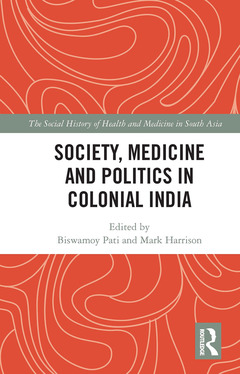Society, Medicine and Politics in Colonial India The Social History of Health and Medicine in South Asia Series
Coordonnateurs : Pati Biswamoy, Harrison Mark

The history of medicine and disease in colonial India remains a dynamic and innovative field of research, covering many facets of health, from government policy to local therapeutics. This volume presents a selection of essays examining varied aspects of health and medicine as they relate to the political upheavals of the colonial era. These range from the micro-politics of medicine in princely states and institutions such as asylums through to the wider canvas of sanitary diplomacy as well as the meaning of modernity and modernization in the context of British rule.
The volume reflects the diversity of the field and showcases exciting new scholarship from early-career researchers as well as more established scholars by bringing to light many locations and dimensions of medicine and modernity. The essays have several common themes and together offer important insights into South Asia?s experience of modernity in the years before independence. Cutting across modernity and colonialism, some of the key themes explored here include issues of race, gender, sexuality, law, mental health, famine, disease, religion, missionary medicine, medical research, tensions between and within different medical traditions and practices and India?s place in an international context. This book will be of great interest to scholars and researchers of modern South Asian history, sociology, politics and anthropology as well as specialists in the history of medicine.
List of Figures and Tables. Contributors. Acknowledgements. Introduction 1. The Sentencing of Assisted Suicide in the Nizamut Adawlut, 1810-1829: Religion, Health and Gender in the Formation of British Indian Criminal Law 2. The Great Shift: Cholera Theory and Sanitary Policy in British India, 1867-1879 3. Hakims and Haiza: Unani Medicine and Cholera in Late-Colonial India 4. Of Cholera, Colonialism and Pilgrimage Sites: Rethinking Popular Responses to State Sanitation, c.1867-1900 5. Western Science, Indigenous Medicine and the Princely States: The Case of the Ayurvedic Reorganisation in Travancore, 1870-1940 6. Christian Missionary Women’s Hospitals in Mysore State, c. 1880-1930 7. The Epidemiological, Health and Medical Aspects of Famine: Views from the Madras Presidency (1876-78) 8. Gender and Insanity: Situating the Asylums in Nineteenth-Century Bengal 9. Confining 'Lunatics': The Cuttack Asylum, c.1864-1906 10. What did the ‘Wise Men’ Say? Gender, Sexuality and Women’s Health in Nineteenth-Century Bengal 11. Feminizing Empire: The Association of Medical Women in India and the Campaign for a Women’s Medical Service 12. Indian Physicians and Public Health Challenges: Bombay Presidency, 1896-1920 13. Tracking Kala-azar: The East Indian Experience and Experiments. Index
Biswamoy Pati was Senior Fellow at the Nehru Memorial Museum and Library, New Delhi, and taught Modern Indian History at the Department of History, University of Delhi, India. His research is on the diversities of colonial South Asia and some of his books include Resisting Domination: Peasants, Tribals and the National Movementon Orissa, 1920–1950 (1993) and South Asia from the Margins: Echoes of Orissa,1800–2000 (2012). He edited The 1857 Rebellion (2007); and co-edited (with Mark Harrison) Health, Medicine and Empire (2001) and The Social History of Health andMedicine in Colonial India (2009); and (with Waltraud Ernst) India’s Princely States: People, Princes and Colonialism (2007).
Mark Harrison is Professor of the History of Medicine and Director of the Wellcome Unit for the History of Medicine, University of Oxford, UK. He has written widely on the history of medicine in relation to war, medicine and imperialism. His publications include Public Health in British India (1994); Climates and Constitutions: Health, Race,Environment and British Imperialism in India 1600–1850 (1999); Medicine in an Ageof Commerce and Empire: Britain and Its Tropical Colonies 1660–1830 (2010); Contagion (2011); several edited volumes; and Health, Medicine and Empire: Perspectives onColonial India (2001) and The Social History of Health and Medicine in Colonial India (2009) both co-edited with Biswamoy Pati.
Date de parution : 12-2020
13.8x21.6 cm
Date de parution : 02-2018
13.8x21.6 cm
Thème de Society, Medicine and Politics in Colonial India :
Mots-clés :
Sanitary Commissioner; Dufferin Fund; sanitary; Zenana Hospital; commissioner; Indigenous Medicine; dufferin; Leprosy Sufferer; fund; International Sanitary Conference; zenana; Women’s Hospitals; hospital; Unani Tibb; leprosy; Kala Azar Cases; sufferer; Circuit Court; medical; British Women Doctors; women; Women’s Medical Service; Mark Harrison; Shastric Tradition; Jane Buckingham; Control Kala Azar; Saurabh Mishra; Women Lunatics; Amna Khalid; Mysore City; Burton Cleetus; Kala Azar Treatment; Barbara N; Ramusack; British Legal Authorities; Leela Sami; Classical Sanskrit Texts; Debjani Das; Puerperal Mania; Sujata Mukherjee; Contemporary Society; Samiksha Sehrawat; Travancore State; Mridula Ramanna; Criminal Lunatics; Achintya Kumar Dutta; Magh Mela; Women Doctors



